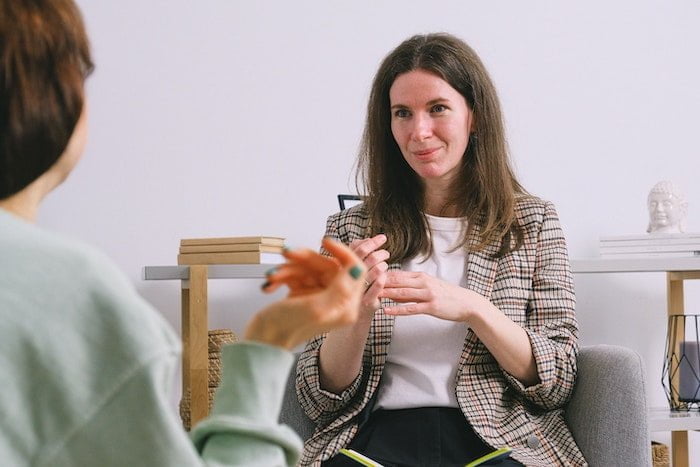Quick links for Addiction Counselling
- What is addiction counselling?
- Types of addictions that benefit from addiction counselling
- The role of an addiction counsellor
- The differences between addiction counselling and addiction therapy
- When is addiction counselling appropriate?
- The benefits of a holistic approach to treatment and addiction counselling
- How do I access addiction counselling?
When a person lives with an addiction they often experience a loss of control. This can be particularly challenging to face and overcome.
Along with the ambivalent feelings that many have around drugs or alcohol, finding a way to permanent sobriety is usually difficult, which is where addiction counselling comes in.
The nature of addiction means that the chemicals in the brain and hormones in the bodily systems are unbalanced.
This has repercussions on mental health, motivation, and self-belief.
In a society where individualism is celebrated, it’s important to remember the healing power of human connection. This is especially important when addressing addiction.
With the support of others, people are often able to support themselves.
This is a very natural part of the human condition.
The best approach to treatment for addiction is one that utilises various different techniques. Addiction is a complex disease with many layers.
Addiction counselling is just one aspect of treatment, [1] but it’s been shown time and time again to be very effective for people trying to beat addiction throughout the UK.
What is addiction?

Patient sat on a sofa speaking with an addiction counsellor
Addiction is when an unhealthy habit has developed regarding a particular substance or habit.
It generally has negative repercussions throughout all areas of a person’s life. Despite the negative effects, addiction means that the person is unable to stop their addictive behaviours.
There are both physical and psychological addictions. One can exist alone or they can both occur at the same time.
For many people, addiction originates as a coping mechanism.
At the start of the habit, substances are often used in order to self-medicate – to improve moods, feelings, and to make life feel easier to manage.
When drugs or alcohol are needed in order to function normally, or if a person obsessively thinks or worries about getting their next drink or high, then an addiction exists.
There are both physical and psychological withdrawal symptoms. Both can be very distressing and often result in substance use occurring again.
Addiction is considered a disease by many professionals. It’s also treated as such through the 12-step approach.
What is addiction counselling?

Two people talking during addiction counselling
Counselling is a type of treatment. There are many types from casual conversations to deep psychological and clinical addiction counselling. [2]
At the centre of the approach, the focus is on allowing the person accessing counselling to reflect on, articulate and process their feelings and emotions.
This is often a space where a person learns about themselves.
The counselling space is one that is non-judgemental.
The addiction counsellor will sometimes offer useful ideas and advice. Quite often, counsellors have been through similar experiences themselves or been affected by someone close who has.
There are both individual and group approaches to facilitating the counselling approach. Through drug and alcohol rehabilitation programmes there is usually access to both types.
As well as conversation-based work, there are alternative types of counselling, such as art and music therapy.
The latter two can be very useful for those who find talking more difficult and need a more creative approach to addiction counselling. [3]
Types of addictions that benefit from addiction counselling

Addiction counsellor and patient talking together
Addiction counselling is helpful in treating various behaviour-related conditions.
Often, clients might experience more than one condition and sometimes this occurs alongside a mental health problem. This would be known as dual diagnosis.
In the event of dual diagnosis, private rehabilitation clinics are very efficient at providing recovery treatment to support the individual from all angles.
Conditions that benefit from counselling include:
- Drug addictions
- Alcohol addiction
- Gambling
- Sex or porn addiction
- Internet addiction
The role of an addiction counsellor

Counsellor taking notes during an addiction counselling session
The role of a counsellor is incredibly important. It can be key in supporting a person to develop self-belief, hope in the future, and to make changes that facilitate a sober lifestyle.
For effective addiction counselling to take place, the counsellor will work towards the following:
- Providing a safe space for listening, self-compassion, and understanding.
- Creating an empathic relationship with the client. This professional bond should enable the client to trust the counsellor and to be able to talk freely about problem areas during addiction counselling.
- Helping the client to identify underlying issues and trauma that might have caused and be triggering the addiction.
- Supporting the client on their recovery journey. The addiction counsellor will facilitate discussion around the addiction and should enable the client to come to understand themselves more.
- Suggesting healthy coping strategies. This practical help is often invaluable to the client outside of the addiction counselling space. It’s also essential in supporting relapse prevention.
Some counsellors are qualified to diagnose conditions. In the case that other problem areas arise, they’d be able to signpost or support people in other appropriate treatments.
The aim of addiction counselling

Addiction counselling taking place at a residential rehab clinic
The main goal of counselling is to enable the client to develop an understanding of how the addiction has come to be.
It should allow the client to explore their feelings through discussion, art, or music.
The reflection and processing of talking often bring revelations that help the client to make healthier decisions going forward.
The differences between addiction counselling and addiction therapy

Addiction counsellor looking directly at a camera
Although both counselling and therapy are predominantly discussion-based, there are some significant differences between the approaches. [4]
Counselling is usually a conversation-based treatment. It facilitates the exploration of feelings and emotions.
The counsellor might make unbiased suggestions, or give expert advice.
Addiction counselling treatments tend to be effective at treating the problems that are on the surface.
Therapy is a psychological treatment. Most therapists work from an integrative perspective.
This means they will use their knowledge to lead you through an exploration of problems, often bringing up underlying difficulties.
A therapist is able to support you in identifying the underlying causes of your addiction.
Therapies are also a hugely effective evidence-based part of addiction treatment. Cognitive Behavioural Therapy (CBT) and Dialectical Behavioural Therapy (DBT) are often used to explore a person’s thoughts and emotional processes.
These therapies reveal how the mind affects behaviour. Therapists also provide very practical behaviour management techniques for patients to implement throughout their lives.
When is addiction counselling appropriate?

Young person sat in an addiction counselling session
Counselling sessions can be a really helpful way for a person to understand that they have an addiction problem.
Many people live in a state of denial over the severity of their drug or alcohol use. Also, people living with addictions might start to shut off from what their loved ones are saying.
Counsellors provide an unbiased, honest, and yet distinctly empathic point of view.
They provide a reflection that enables a person to see the gravity of their addiction.
Counselling also supports people who are already in addiction treatment.
Through this approach, people are able to process how they’re feeling about any other physical and psychological therapies they’re receiving.
In order for healing to take place, honesty, openness and a willingness to participate is essential.
How will an addiction counsellor help you?

Teenager taking part in a session of addiction counselling
For those living with an addiction, a counsellor will support you to become more confident in your ability to quit the substance.
The counselling relationship will also support you to feel more confident about creating a fulfilling and sustainable abstinent lifestyle for yourself.
The benefits of a holistic approach to treatment and addiction counselling

Addiction counselling session in progress at a drug and alcohol rehab
It’s widely recognised that the most effective way to treat addiction is through a holistic approach.
A person is a sum of parts and every part of a person needs to be treated in order for healing and recovery to take place.
Rehabilitation clinics provide treatments in the following areas to ensure a person receives a comprehensive recovery programme:
- Physical treatment, including detox for physical dependencies
- Psychological treatments, including therapies
- Alternative therapies, such as mindfulness, yoga and reiki
- Group work including the 12-step approach
How do I access addiction counselling?

Addiction counsellor listening to a patient during an addiction counselling session
To find out where you can access a local counsellor who specialises in the area of addiction, contact OK Rehab.
Our team of advisors can guide you through counselling options as well as answer any other questions you might have about other treatments.
There are rehab programmes throughout the UK, there are options that can support you in your local area towards a life of healing and recovery. Contact OK Rehab to begin your future of recovery.






